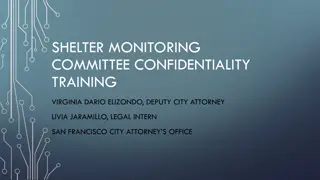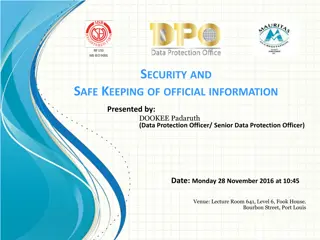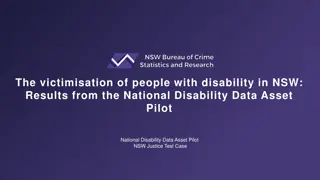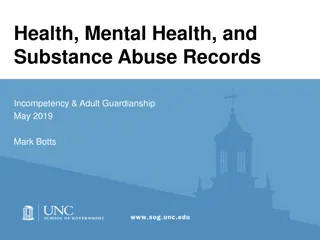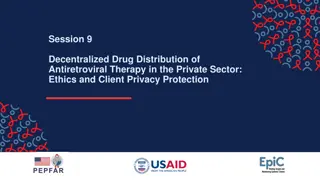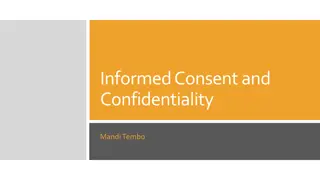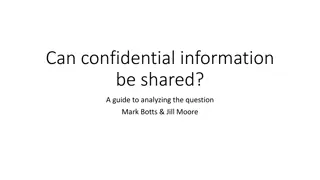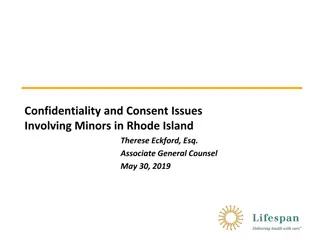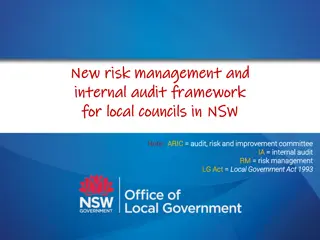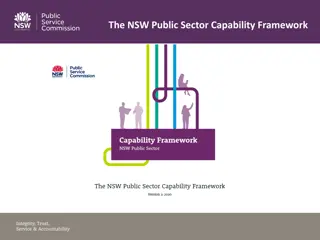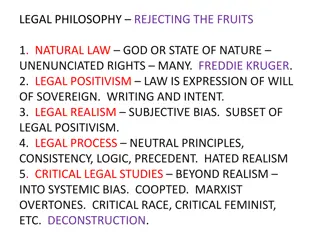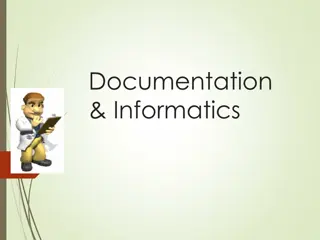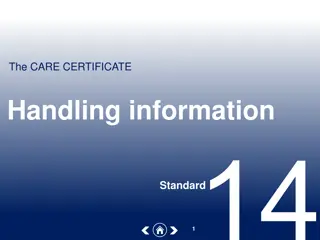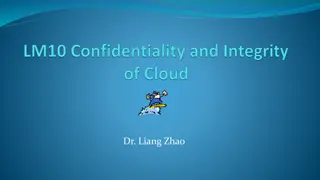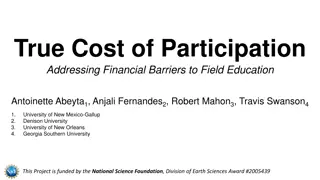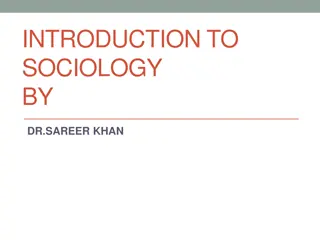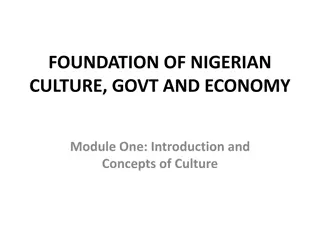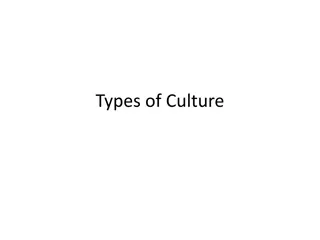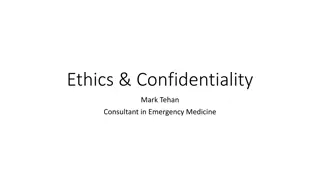Exploring Confidentiality and Disputant Participation in NSW Legal Culture
This study delves into the relationship between confidentiality and disputant participation led by Dr. John Woodward, focusing on the challenges and uncertainties in NSW's legal landscape. It analyzes the implications of mediation confidentiality, testing legal professional identity elements, and addressing the lag in dispute resolution practices. Through interviews with lawyers and mediators, the study uncovers insights into the preference for resolving disputes quietly and the complexities surrounding confidentiality in legal proceedings.
Download Presentation

Please find below an Image/Link to download the presentation.
The content on the website is provided AS IS for your information and personal use only. It may not be sold, licensed, or shared on other websites without obtaining consent from the author. Download presentation by click this link. If you encounter any issues during the download, it is possible that the publisher has removed the file from their server.
E N D
Presentation Transcript
Exploring the relationship between confidentiality and disputant participation Dr John Woodward
Overview Is NSW different? Are we lagging behind in DR culture? Methodology of this study. Testing the 3 core elements of legal professional identity. The notion of confidentiality how does it equate to privilege? The limits of mediation confidentiality from Field v Commissioner for Railways (1957) 99 CLR 285to Liu v Fairfax Media Publications [2012] NSWSC 1352. Uncertainty in the legislation Civil Procedure Act 2005, the Succession 2006 and beyond. The consequences of uncertainty around mediation confidentiality.
The problem in NSW: Are we lagging behind? The Civil Procedure Act, 2005 Part 2A fiasco. The future of dispute resolution: a word from the Chief Justice of NSW (and what about the debt collectors?)
Methodology An empirical, qualitative study of semi structured interviews with 35 lawyers and mediators. Lawyers Mediators Male 15 3 Female 12 5 City 4 4 Regional 18 4 Rural 5 0 Table 1. Gender and geographic distribution of respondents
Table 2 Distribution of respondent lawyer sample by work mix and geographic location City Regional Rural Family Law 6 3 Personal Injury 1 Estate Litigation 4 Commercial Litigation 1 4 1 Insurance Litigation 1 Banking and finance 3 General Practice 2 1 TOTALS 4 18 5
The notion of confidentiality A defining element of mediation (Boulle); The reason why some disputants choose mediation rather than airing their dirty linen in the public forum of the court; Confidentiality requires protection from both disclosure and misuse (eg commercially sensitive information, preservation of relationships etc) Eastern culture preference to resolve disputes quietly within the family and local community; Western idea of settlement privilege to facilitate open discussion to settle court cases.
Confidentiality is more than privilege Settlement Privilege is protected by section 131 of the Evidence Act 1995 (NSW) and section 30 of the Civil Procedure Act 2005 (NSW) Common law privilege has been explained by the Court as follows: It is of the essence of successful mediation that parties should be able to reveal all relevant matters without an apprehension that the disclosure may subsequently be used against them. As well, were the position otherwise, unscrupulous parties could use and abuse the mediation process by treating it as a gigantic, penalty free discovery process. AWA Limited v George Richard Daniels (1992) 7 ACSR 463 at 468 Rogers CJ Comm D.
The Limits of Mediation Confidentiality Civil Procedure Act, 2005 (NSW) and Evidence Act 1995 (NSW) protect settlement privilege. They do not protect confidentiality. Confidentiality provisions contained in s 31 of Civil Procedure Act apply only to mediators, not to parties or their lawyers. There are no other confidentiality protections contained in CP Act. Contractual provisions between mediators and parties requiring confidentiality to not protect court-annexed mediations where there is no contract between the mediator and parties (eg Family Provisions mediations in Supreme Court of NSW).
Consequences of uncertainty around limits of mediation confidentiality Lawyers advise clients to be careful what they say in mediation, not so say anything unless they run it by counsel beforehand, to speak only if you re spoken to or to say nothing at all.
Uncertainty around confidentiality leads to reduction of disputant participation Research question: When attending an ADR event, do you have a practice regarding the level of your client s involvement in the process: that is, do you prefer to speak on behalf of the client or do you prefer to have the client speak during the process?
The research evidence It tends to be that either I, or if counsel is involved, counsel, opens and I think that is generally safer but there are instances where the client is sufficiently switched on and intelligent and eloquent and confident enough to open and is not going to end up doing more harm than good but it tends to be the exception rather than the rule. I cannot think of an instance where the client has spoken
The evidence (cont.) Mostly our clients don t speak. We have said to them that they are more than welcome to but if you re going to get emotional or hysterical then our preference would be don t. Mostly the clients don t. They choose not to.
The evidence (cont.) I think that they might blurt something out without thinking so I would encourage them to go into one of the breakout rooms and discuss it Q. Alright I just want to take you back to something you said about blurting out something in the mediation. Is that a concern for you that someone would do that? A. Yes. Q. Why is that a concern? A. Just because the clients have engaged their lawyers for a reason so they might say something that would be prejudicial to their case without realising it and they might say something that is privileged and even though I understand that mediation is not allowed to be used in court, I still think it is best if they be advised against giving away anything because it could assist the other side to subpoena them for something or to send them a notice to produce about information or a document that they might not otherwise have known about.
The evidence (cont.) No, I like to do the talking or let counsel do the talking. I use the speak if you re spoken to approach. And I justify that on the basis of, you know, you could get yourself into trouble. You could give away something that you really don t want to give away.
The evidence (cont.) No, I don t think it is a good idea for the client to be doing the talking. No, not at all. It s for the professionals. It s a much more subtle process the whole negotiation and the whole process. A client could sour the whole thing so quickly. Forty years of legal experience allows me to be involved in the process.
Conclusions from the evidence? Reasons for discouraging disputant participation are concerns around giving away or blurting out something which is confidential; Desire to protect confidential information from misuse.
Other incidental outcomes Helps to preserve the balance of power in favour of the lawyer (Macfarlane s third core element of legal professional identity); Sustains the belief in the lawyer as expert in the DR process; Inhibits the free flow of information between the parties and reduces the likelihood of parties being able to work together to reach consensus.
Rosenthals Research Result Active Client Passive Client Good 75% 41% (21) (12) N = 33 Poor 25% 59% (7) (17) N = 24 N = 28 N = 29 N = 57 Table 3: Client Participation Related to Case Result
The effect of affect Carnevale and Ison Research Inducing positive affect produces positive outcomes; Inducing negative affect produces negative outcomes.
Conclusion The dilemma of court-connected mediation, the site where mediation collides with the traditional justice institutions, has not yet been resolved. The competing public interests in settlement privilege and confidentiality on one hand and the admissibility of all relevant evidence on the other have yet to be reconciled.
The End Questions?







